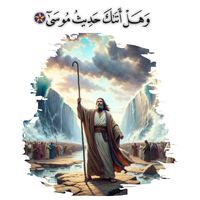O Children of Adam! Dress properly whenever you are at worship.

Ya Rabb
"So remember Me — and I will remember you." (Surah Al-Baqarah, 2:152)
Ya Rabb was born from yearning — the kind of yearning that begins as a whisper in the heart:
Ya Rabb means: O the Most High.
And sometimes, that’s all the prayer we need.
"O Musa, I have chosen you for Myself."
(Taha, 20:41)
As a Muslim, I’ve always been deeply moved by the Qur’an — especially Surah Taha.
To Muhammad ﷺ, Allah said with mercy and reassurance:
"We did not reveal the Qur’an to you to cause you distress." (Taha, 20:2)
These verses aren't just for prophets. They are signs for us — for anyone searching for truth, meaning, or healing. They remind us that Ar-Rahman, the Most Merciful, has always spoken, always guided, always forgiven.
It’s a surah that feels alive with Divine speech, full of moments where Allah speaks directly to His prophets with love, power, and clarity.
When Allah said to Musa:
"Indeed, I am Allah. There is no deity except Me, so worship Me and establish prayer for My remembrance."
(Surah Taha, 20:14)
It reminds us: we were created for remembrance. For connection. For purpose.
I was especially struck by how Allah chose Musa (Moses) and spoke to him:
"O Musa, I have chosen you over the people with My messages and My words [to you]. So take what I have given you and be among the grateful."
(Surah Taha, 20:13)
There’s something breathtaking about that — Allah choosing, Allah speaking, Allah guiding. But Surah Taha is also about another mercy: the Prophet Muhammad ﷺ.
Allah reassures him with these beautiful words at the very beginning:
"We have not sent down to you the Qur’an that you be distressed." (Surah Taha, 20:2)
It’s a reminder that this message was never a burden — it was a mercy. A light. A healing. A gift from the Most Loving to the Final Messenger ﷺ.
So when I created Ya Rabb, I created it as a call — not just to Muslims, but to anyone who is seeking. Anyone who has felt lost. Anyone who is searching for meaning in a noisy, chaotic world.
Because Ya Rabb is that cry of the heart.
It’s what Musa said: "Ya Rabb, expand for me my chest, ease for me my task, and untie the knot from my tongue."
(Surah Taha, 20:25-27)
And it’s what Muhammad ﷺ embodied — patience, trust, and complete submission to Allah even under pressure, isolation, and rejection.
This isn’t just a brand. It’s a reminder.
That even today, the doors of Divine closeness are still open.
That Allah still chooses, still hears, and still responds. Whether you were born Muslim or you’re just now feeling the pull toward something greater —You’re welcome here.
"And We have already created man and know what his soul whispers to him, and We are closer to him than [his] jugular vein."
وَلَقَدْ خَلَقْنَا الْإِنسَانَ وَنَعْلَمُ مَا تُوَسْوِسُ بِهِ نَفْسُهُ ۖ وَنَحْنُ أَقْرَبُ إِلَيْهِ مِنْ حَبْلِ الْوَرِيدِ
(Surah Qaf, 50:16)
The One who created you is closer than the vein that keeps you alive.
Even in silence — He hears.
Even in sorrow — He sees.
Even when you forget Him — He never forgets you.
"Say, O My servants who have wronged their souls, do not despair of the mercy of Allah. Indeed, Allah forgives all sins." (Surah Az-Zumar, 39:53)
Yet for those who persist in forgetting…
"They forgot Allah — so He forgot them."
(Surah At-Tawbah, 9:67)
"So today We will forget them as they forgot the meeting of this Day of theirs."
(Surah Al-A’raf, 7:51)
To wear Ya Rabb is to carry a reminder.
A silent du’a. A call back to The Most High.
"So remember Me — and I will remember you." (Surah Al-Baqarah, 2:152)